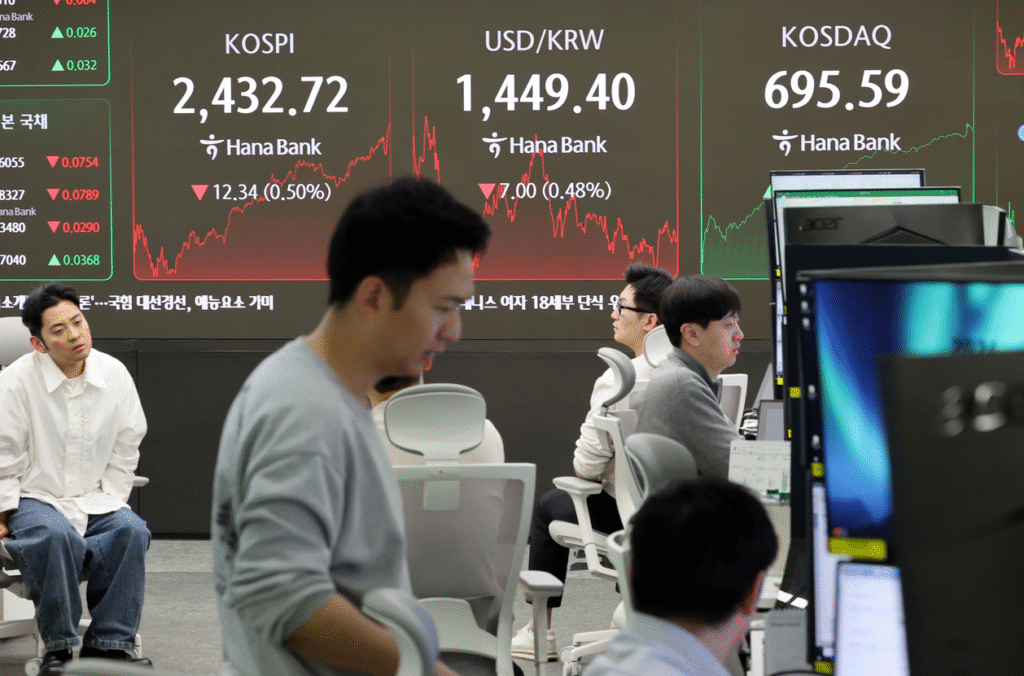South Korea to Launch 24 Hour FX Trading: A Big Step for Global Investors
South Korea is planning to make a major change in its financial market. The country has announced that it will soon allow 24 hour foreign exchange (FX) trading for the Korean won. Until now, trading in the won has been limited to certain hours, but the government wants to remove these restrictions. This move is expected to make South Korea more attractive to global investors and bring the local financial market closer to international standards.
Current Situation of FX Trading in Korea
At present, trading in the South Korean won usually stops around 2 a.m. local time. This creates a gap for traders in other parts of the world, especially those in Europe and the U.S., where trading hours are different. Many investors have long argued that this time limit makes the Korean market less flexible and harder to access compared to other global markets like New York, London, or Tokyo.
What Will Change With 24 Hour Trading?
The new plan aims to completely open the market for 24 hour FX trading. This means that traders from anywhere in the world can buy and sell the Korean won at any time of the day or night.
The government also plans to:
-
Remove most time restrictions on trading.
-
Build a new FX network inside the Bank of Korea. This will allow offshore or foreign investors to trade the won more easily.
-
Improve the system for monitoring and settlement to ensure security and transparency in transactions.
Why South Korea Is Making This Move
There are several key reasons why the government is moving toward 24-hour FX trading:
-
Globalization of Markets – Most major financial centers operate round-the-clock trading. South Korea wants to align itself with global practices.
-
Attracting Foreign Investors – By allowing investors worldwide to trade the won without time limits, South Korea can draw in more international money.
-
Stronger Role for the Korean Won – With 24-hour trading, the won could become more recognized and widely used as an international currency.
-
Boosting Market Competitiveness – This change will make the Korean market more modern, flexible, and competitive compared to regional rivals.
Benefits for Investors
This reform offers many benefits to both local and global investors:
-
More Flexibility: Investors can trade at any time, without worrying about the market being closed.
-
Faster Reactions: Traders can respond immediately to global events, such as changes in oil prices or U.S. Federal Reserve announcements.
-
Easier Access for Foreign Investors: Offshore traders will no longer face barriers to trading the won.
-
Improved Liquidity: With more trading hours, there will likely be higher trading volume and smoother transactions.
Challenges and Risks
While the plan has many advantages, there are also challenges:
-
Market Volatility – With more hours of trading, sudden changes in currency value could happen more often.
-
Need for Stronger Regulation – The government and the Bank of Korea will need to closely monitor transactions to avoid risks like currency manipulation.
-
Technology Upgrades – A secure, reliable, and modern trading network must be built to handle 24-hour activity.
How the Bank of Korea Will Help
The Bank of Korea will play a central role in this change. The bank is working to create a new foreign exchange trading network that can manage all transactions safely. This network will also make it easier for foreign banks and financial institutions to take part in the Korean market. By doing this, the Bank of Korea ensures that the system remains transparent, secure, and efficient.
Global Impact of the Change
If South Korea successfully introduces 24-hour FX trading, it could have an impact beyond its borders:
-
Stronger Asian Financial Hub: Seoul could grow as a key financial hub in Asia, competing with Tokyo, Hong Kong, and Singapore.
-
More Interest in the Won: International businesses and investors may start using the Korean won more frequently.
-
Closer Integration with Global Markets: South Korea will become more connected with global financial flows, attracting investment from across the world.
Comparison With Other Countries
-
United States: The U.S. dollar already trades 24 hours globally and is the world’s most dominant currency.
-
Japan: The Japanese yen is also traded around the clock, making Tokyo a top global FX hub.
-
Singapore and Hong Kong: These markets are known for open and flexible trading, attracting global investors.
By joining this group, South Korea positions itself alongside the world’s top financial centers.
What This Means for Businesses in Korea
It’s not just foreign investors who benefit. Korean businesses will also see positive effects:
-
Exporters and Importers can manage currency risks more easily.
-
Banks and Financial Institutions can offer more services to their clients.
-
Startups and Tech Companies may find it easier to attract foreign investment.
This could help boost the Korean economy overall, making it more dynamic and globally connected.
Conclusion
South Korea’s decision to allow 24 hour FX trading is a bold and forward-looking step. By opening its currency market without time limits, the country is not only making trading easier but also signaling its ambition to become a global financial hub. While challenges like market volatility and regulation remain, the potential benefits for investors, businesses, and the economy are enormous.
In simple words, this change means that anyone, anywhere in the world, will soon be able to trade the Korean won at any time of the day. This will bring South Korea closer to the world and make its financial market stronger and more open.


